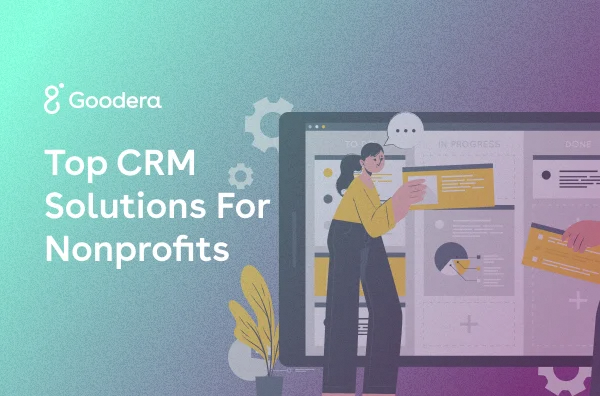The Most Complete Guide You Will Find on Corporate Volunteering Programs
Corporate or employee volunteerism has emerged as a novel way for organizations to attract and retain their most valuable asset: employees. Corporate volunteering, also called employee volunteering, plays a vital role in articulating a company's mission and vision for a better world — it serves as a platform to showcase their commitment to social responsibility and highlight the causes they support. In today's competitive job market, companies are going above and beyond to stand out, and corporate volunteering is a powerful tool for doing just that.
In this compact guide, we’ll discuss what corporate volunteering is and its benefits, along with tips for creating a successful corporate/employee volunteer program at your own workplace.
What is Corporate Volunteerism?
Corporate volunteerism, or corporate volunteering, is a workplace program or initiative in which companies encourage employees to give back to the community through various volunteering activities. Through such company volunteer programs, employees contribute positively to society and develop new skills like leadership, self-awareness, and improved collaboration among teams.
By engaging employees in volunteer work, companies can create a positive work culture, enhance employee satisfaction, and drive long-term revenue impact through better staff retention, engagement, and customer loyalty. Companies get to showcase their commitment to social responsibility and improve their public image. It's a great way to show that businesses are more than just money-making machines — they have a heart too!
How do companies encourage employees to volunteer their time?
👉 Paid Time Off (PTO) for Volunteering: Companies can offer PTO to incentivize employees to volunteer at work. This allows employees to take time off without worrying about losing their pay or falling behind.
Software company Salesforce offers employees seven days of paid time off annually to volunteer for any cause they support. Patagonia offers employees two months of paid leave to work on environmental projects of their choice.
👉 Donation Matching: Companies can motivate employees to volunteer by matching their donations to charitable organizations. This shows the company's commitment to social responsibility and encourages employees to donate to causes they care about.
Microsoft matches employee donations to eligible nonprofits up to $15,000 annually. Adobe matches employee donations up to $10,000 per employee per year.
👉 Pro-Bono Volunteering Programs: Companies can offer pro-bono volunteering programs where employees use their professional skills to help nonprofits and social enterprises. This enables employees to learn new skills, collaborate with colleagues from different departments, and work with senior leadership on community impact projects.
Morgan Stanley's "Strategy Challenge" program encourages employees to provide pro-bono strategic advice to nonprofit organizations. IBM's Corporate Service Corps program sends employees on 4-6 week assignments to work locally in developing countries on technology, strategy, and operations.
8 Benefits of Corporate Volunteering Programs
Volunteering as a company can provide multiple benefits, including improved employee engagement, enhanced brand reputation, and increased customer loyalty.
Listed below are eight unique benefits of employee volunteerism and the many ways it can benefit your company and community.
- Employee Engagement: Your company can increase employee engagement by providing volunteering opportunities for employees to connect with each other, the community, and the company's mission beyond the workplace. It allows teams to work on meaningful projects and positively influence their communities, which may enhance their sense of purpose and job happiness.
- Learning and Development:Employees who volunteer their time develop new skills and expand their expertise while helping others, allowing them to acquire knowledge and experiences to advance their professional development. This is particularly important for Millennials and Gen Z, who prioritize L&D in their careers.
- Improved Public Image: Workplace volunteering can enhance a company's reputation and demonstrate its commitment to positive social impact. Customers are also more likely to stay loyal to a socially responsible company.
- Employee Retention: Employees who volunteer their time in CSR programs are likelier to stay with their employers. Employees participating in community service and other charitable endeavors may also adopt a feeling of social responsibility.
💡 Did you know?
Deloitte found that 75% of Millennials and 79% of Gen-Z believe businesses should take more action on social and environmental issues. Additionally, 38% of Millennials and 44% of Gen-Z stated they would leave their current employer within the next two years if they did not see a commitment to social responsibility.
- Increased Productivity:Workplace volunteering improves employee productivity by providing opportunities for employees to take a break from their routine work, reducing burnout and increasing job satisfaction. It boosts productivity by enabling employees to develop new skills, collaborate with colleagues, and take on leadership roles outside their regular job duties.
- Talent Attraction: Your company can attract top talent by demonstrating a commitment to social responsibility and providing opportunities for employees to connect with the community.
- Cost Savings: CSR and volunteering initiatives provide cost savings to companies by improving employee retention rates, boosting morale, reducing absenteeism, and increasing overall job satisfaction. Companies can foster a positive work environment, leading to a more committed and satisfied workforce and ultimately reducing costs associated with high employee turnover and the need for extensive recruitment and training.
- Positive Social Impact: Corporate Volunteering programs positively impact the community and society, improving the company's social value and contribution to society. The positive impact enhances the company's value and contribution to society, which can attract socially conscious consumers and stakeholders.
Ready to take your Corporate Volunteering Program to the next level? Here are six crucial tips to help you create a successful EVP that will engage and inspire your employees and positively impact your community.
Tips for creating a successful Corporate Volunteer Program
Take your Employee Volunteer Programs to the next level! These 6 tips will help you create a volunteer program that fosters skill development and employee engagement to its utmost potential.
- Set measurable goals and objectives: The key to executing a successful Employee Volunteer Program (EVP) is clearly defined goals of what the organization wants to achieve with these programs. Specific and measurable goals can be centered around various causes, such as Sustainable Development Goals (SDGs), the number of employees engaged, total volunteer hours, and more. This enables organizations to track progress, measure the program's impact, and make informed decisions about optimizing and improving its volunteer initiatives.
- Offer a strong purpose: Volunteering programs can unite teams across departments and hierarchies, especially if aligned with the organization's mission and goals. Design programs that maximize employee engagement by ensuring that all stages of awareness, action and amplification reflect the organization's commitment to its mission.
- Publicize Your Programs Efforts: Promoting your corporate volunteering programs to increase visibility within the organization, as well as build your brand externally, can help you achieve maximum positive impact. Regular and open communication is vital. Greater visibility of EVPs within organizations can help onboard more employees, and publicizing such efforts helps foster trust and a positive brand image with your community.
💡 Did you know?
Through our engagement with customers, we have found that rewards from employee volunteering programs are significantly higher after 6+ active engagement months.
Want to know how you can plan your first corporate volunteering program? Read our Pocketbook for Volunteering Campaigns.
- Track data to assess progress: EVP data can help organizations maximize their efficacy and impact. It optimizes programs for better employee engagement and participation and enables effective communication of the impact of EVPs to stakeholders such as the board of directors, employees, and customers. It also provides a roadmap for employee groups looking to engage members and guides the strategy for the future.
- Award and recognize top performers: Volunteering can be a rewarding experience, but personal recognition can go a long way in keeping volunteers invigorated, motivated, and driven. Keep track of volunteer hours and offer your top volunteers special prizes or tokens of appreciation.
- Flexible and accessible volunteering options: Lack of transportation, time constraints, and physical mobility limitations can hinder employees. Virtual volunteering is a great way to build an inclusive environment, remove barriers to engagement and provide comfortable and sustainable options to drive impact. Consider offering virtual volunteering opportunities and micro-volunteer opportunities.
Also Read: Lessons learned from our corporate volunteer program
It’s time to wrap up this guide with the top industry insights for corporate volunteerism for organizations in 2025.
Industry Insights on Corporate Volunteerism for 2025
With changing demographics in leadership and the larger workforce, Corporate volunteer work and impactful CSR programs are becoming increasingly vital in attracting and retaining top talent from the millennial and gen-z generations. These generations prioritize meaningful employment and seek out firms that value CSR highly and have a positive social impact.
Here are some industry insights that can help organizations excel at corporate volunteering:
- Curated Digital Experiences: CSR teams are implementing innovative applications of gamification and social media channels to boost employee participation and engagement. As a result, volunteers are increasingly sharing their experiences and boosting the reach of these programs.
- Employee-led Volunteering: Companies are increasingly empowering employees to lead volunteering initiatives, giving them a sense of ownership and purpose. Companies with employee-led volunteering programs have higher job satisfaction and retention rates and fosters leadership development and decision-making skills.
- Disaster Relief: With the increasing frequency and intensity of natural disasters, corporate volunteer programs are including disaster and crisis relief as a pillar of their broader EVP strategy. Companies are training their volunteers to provide immediate assistance during emergencies and partnering with disaster relief organizations to ensure effective and efficient support.
- Impact Measurement: Companies often prioritize impact measurement in their volunteering initiatives, using data to demonstrate social and business value. Companies can communicate their social impact through impact measurement and build trust with customers, employees, and investors.
Various other trends, such as keeping DE&I and environmental sustainability at heart, can enable your employee volunteer programs to thrive.
Find the full list here: Latest CSR trends for 2025.
Goodera helps companies implement Corporate Volunteering programs to support the social responsibility goals of their organization and their employees. We have powered Corporate Volunteerism for 400+ businesses with 10M+ employees. Our hosted volunteering experiences are accessible, engaging, and impactful — bringing people and purpose closer in every workplace.
We power on-demand, corporate volunteering experiences hosted by our ambassadors for your employees, wherever you are in the world. Embrace action on social causes that align with your SDGs with tailored in-person, virtual, and hybrid volunteering programs designed to bring people and purpose together. You can work with our pool of over 50,000 non-profit organizations or have us evaluate an NPO you prefer. So far, we have worked with over 1M volunteers and counting.
Explore the Goodera experience in your preferred language today.













